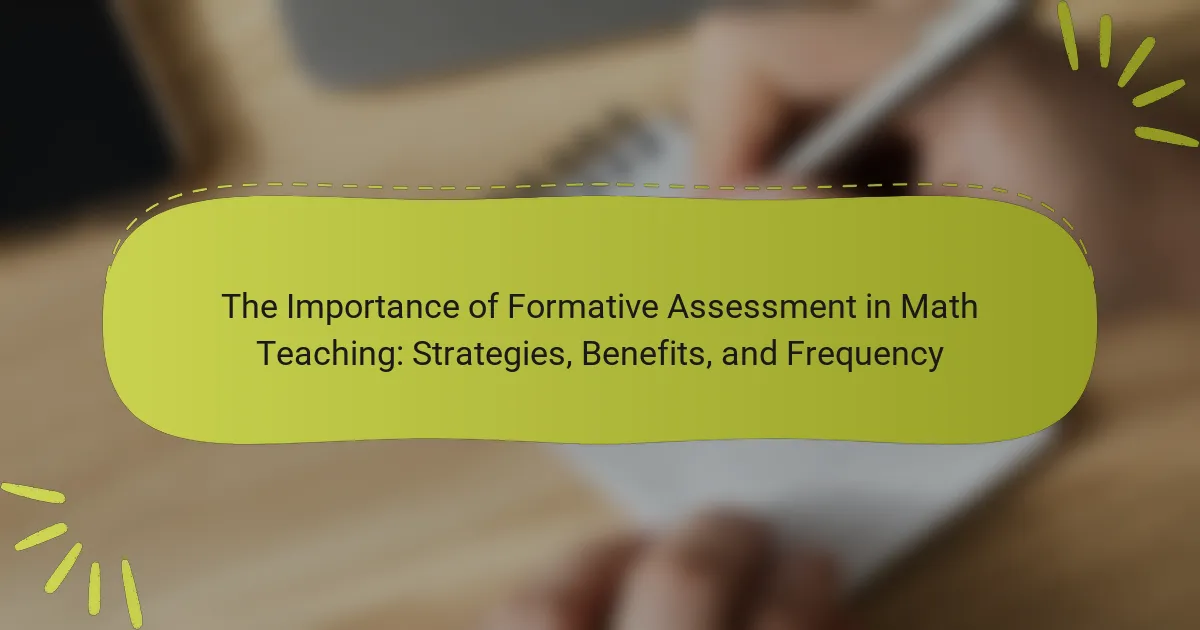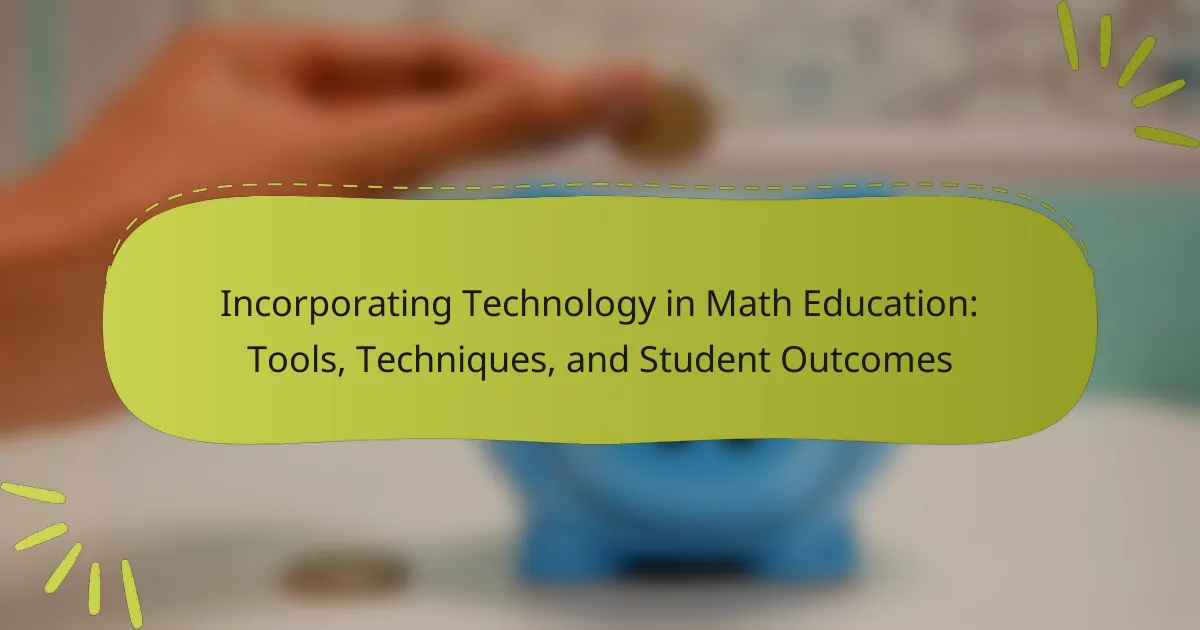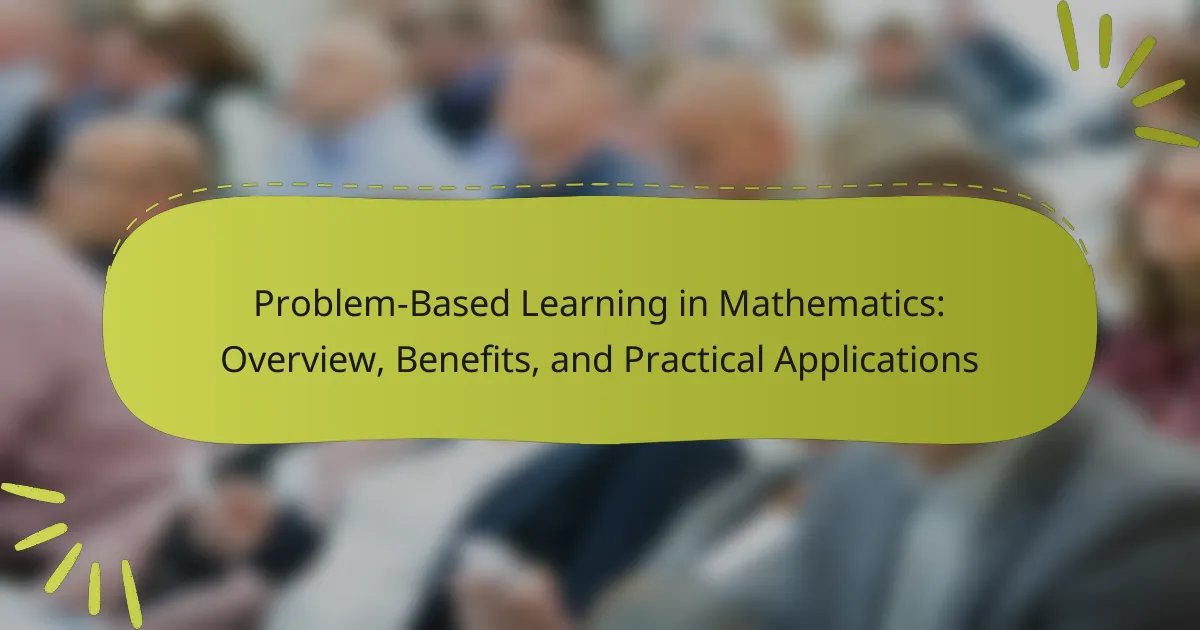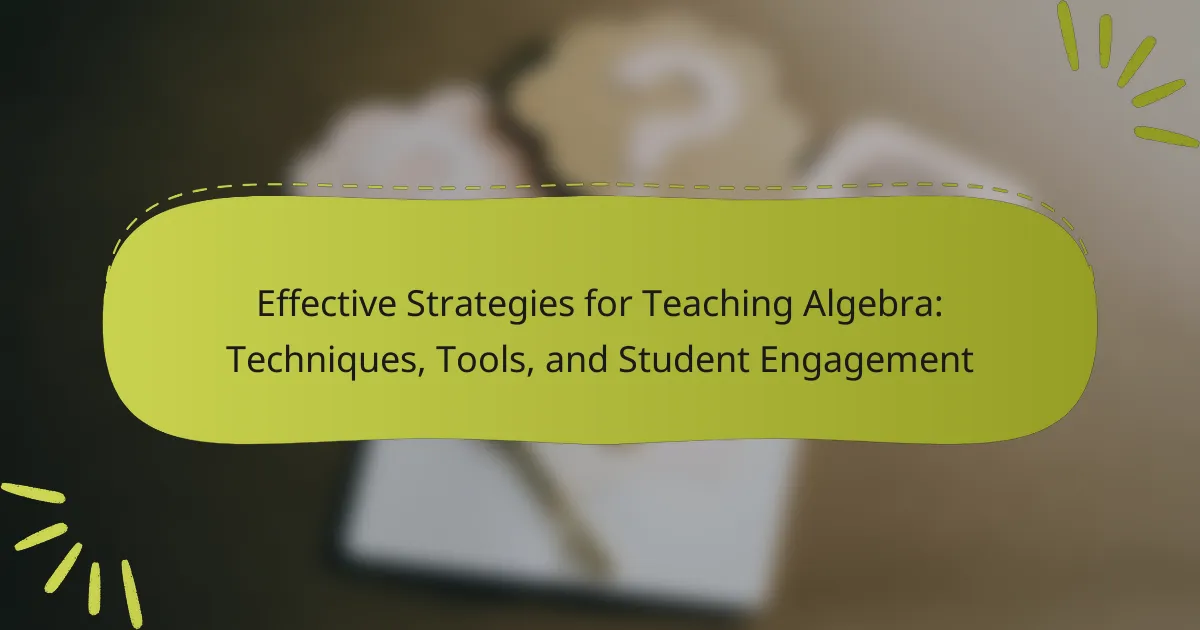Math literacy is a critical factor influencing student success, impacting their problem-solving and critical thinking abilities. Students with strong math skills tend to achieve higher academic performance and excel in standardized assessments, leading to better opportunities in higher education and various career paths, particularly in STEM fields. The article explores effective strategies to enhance math literacy, including interactive learning methods, technology integration, and real-world applications. It also highlights the long-term benefits of improved math literacy, such as increased earning potential and greater confidence in handling quantitative information, ultimately shaping students’ futures.
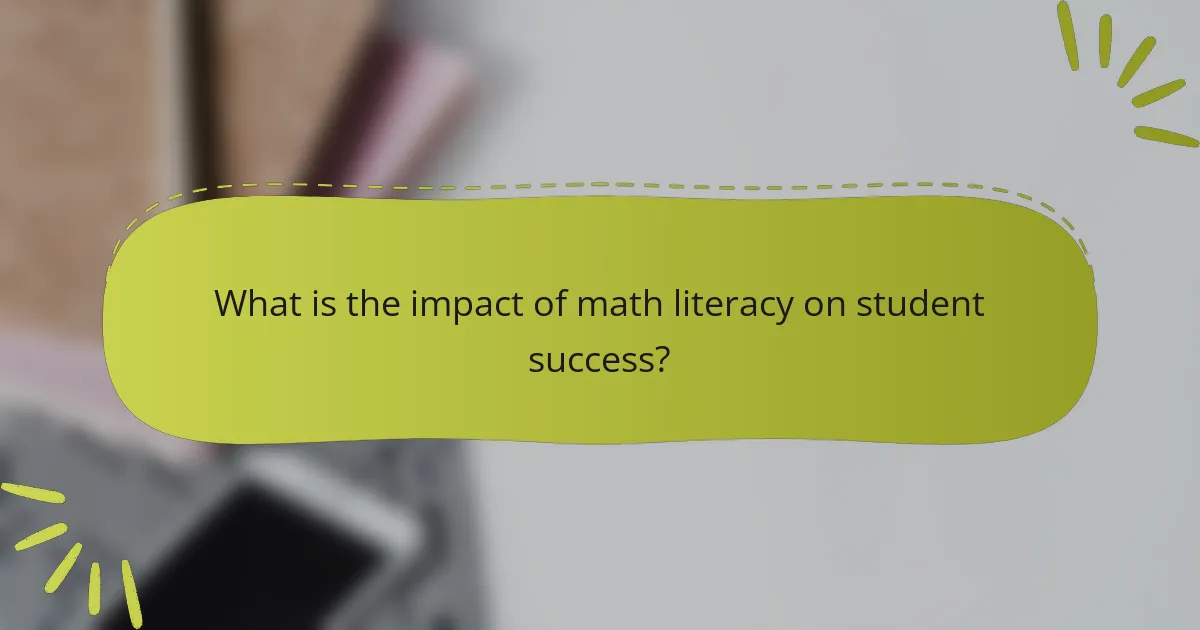
What is the impact of math literacy on student success?
Math literacy significantly enhances student success. It improves problem-solving skills and critical thinking abilities. Students with strong math literacy are more likely to excel academically. They often achieve higher test scores in standardized assessments. Research shows that math literacy correlates with overall academic performance. A study by the National Assessment of Educational Progress found that students proficient in math have better opportunities for higher education. Math skills are essential for many career paths. They are crucial in fields like engineering, finance, and technology. Thus, math literacy plays a vital role in shaping student outcomes and future opportunities.
How does math literacy influence academic performance?
Math literacy significantly influences academic performance. Students with strong math literacy skills tend to excel in various subjects. This is because math literacy enhances critical thinking and problem-solving abilities. Research indicates that students proficient in math are more likely to achieve higher overall GPAs. A study by the National Assessment of Educational Progress found that students with higher math scores also performed better in reading and science. Math literacy fosters a deeper understanding of concepts, leading to better retention of information. Moreover, it prepares students for advanced coursework and standardized tests. Thus, math literacy is essential for academic success across disciplines.
What specific skills are developed through math literacy?
Math literacy develops critical thinking skills. It enhances problem-solving abilities through logical reasoning. Students learn to analyze data effectively. They gain proficiency in numerical operations. Math literacy also fosters pattern recognition skills. Additionally, it improves communication skills in conveying mathematical ideas. These skills are essential for real-world applications. Research shows that math literacy correlates with academic success in various subjects.
How does math literacy correlate with other subjects?
Math literacy positively correlates with performance in other subjects. Research shows that strong math skills enhance problem-solving abilities. This improvement extends to science subjects, where quantitative analysis is essential. In language arts, math literacy aids in understanding word problems and logical reasoning. Studies indicate that students proficient in math often excel in standardized tests across subjects. For example, a report by the National Assessment of Educational Progress found that students with higher math scores also performed better in reading. This suggests a significant relationship between math literacy and overall academic success.
Why is math literacy essential for future opportunities?
Math literacy is essential for future opportunities because it equips individuals with critical problem-solving skills. These skills are vital in various fields, including science, technology, engineering, and mathematics (STEM). A report by the National Math and Science Initiative states that students proficient in math are more likely to pursue higher education. Additionally, math literacy enhances employability in a competitive job market. According to the Bureau of Labor Statistics, many high-paying jobs require strong mathematical skills. Employers often seek candidates who can analyze data and make informed decisions. Thus, math literacy directly correlates with career advancement and economic stability.
What role does math literacy play in career readiness?
Math literacy is essential for career readiness. It enables individuals to analyze data and solve problems effectively. Many careers require mathematical skills for tasks like budgeting, forecasting, and data interpretation. According to the National Assessment of Educational Progress, students with higher math literacy scores perform better in the workforce. Employers often seek candidates with strong math skills for roles in finance, engineering, and technology. Math literacy also fosters critical thinking, which is crucial in decision-making processes. Overall, math literacy significantly enhances employability and career advancement opportunities.
How does math literacy affect lifelong learning?
Math literacy significantly enhances lifelong learning. It equips individuals with essential problem-solving skills. These skills are crucial for navigating everyday situations. Math literacy fosters critical thinking abilities. This helps in making informed decisions throughout life. Studies show that individuals with strong math skills tend to pursue higher education. They are also more likely to engage in continuous professional development. According to the National Assessment of Educational Progress, students with higher math proficiency score better in other academic areas. This correlation indicates that math literacy supports overall educational achievement.
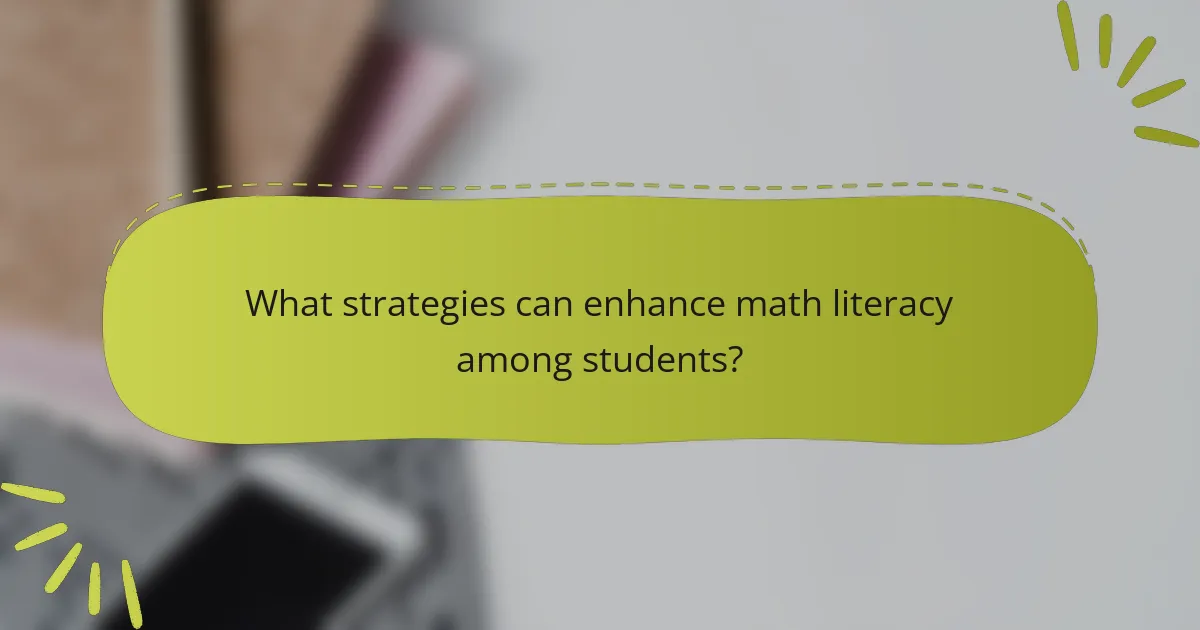
What strategies can enhance math literacy among students?
Implementing interactive learning methods can enhance math literacy among students. Engaging students through games and hands-on activities fosters interest. Collaborative group work encourages peer learning and problem-solving skills. Integrating technology, such as math apps, makes learning accessible and fun. Providing real-world applications of math concepts helps students relate to the material. Regular assessments and feedback guide students’ progress and understanding. Professional development for teachers ensures effective instructional strategies are utilized. Research shows that these approaches significantly improve student outcomes in mathematics.
How can educators implement effective teaching methods?
Educators can implement effective teaching methods by utilizing evidence-based strategies. These strategies include active learning, differentiated instruction, and formative assessment. Active learning engages students in the learning process. It has been shown to improve retention and understanding of material. Differentiated instruction tailors teaching to meet diverse student needs. This approach recognizes that students have varying backgrounds and abilities. Formative assessment provides ongoing feedback to students. It allows educators to adjust instruction based on student performance. Research indicates that these methods enhance student engagement and academic success. For instance, a study by Hattie (2009) found that active learning significantly boosts achievement in students.
What are the best practices for teaching math literacy?
Effective practices for teaching math literacy include using real-world applications. Connecting math concepts to everyday situations enhances understanding. Incorporating visual aids supports diverse learning styles. Engaging students in collaborative problem-solving fosters critical thinking. Regular assessments provide feedback on student progress. Differentiating instruction meets individual learning needs. Utilizing technology can enhance interactive learning experiences. Encouraging a growth mindset helps students overcome challenges.
How can technology be leveraged to improve math literacy?
Technology can be leveraged to improve math literacy through interactive learning tools. These tools include educational software and apps that provide personalized math practice. They adapt to individual learning styles and paces, enhancing engagement. For example, platforms like Khan Academy offer tailored exercises based on student performance. Additionally, gamification in math apps motivates students by making learning fun. Research shows that students using these technologies often achieve higher math scores. A study by the U.S. Department of Education found that technology-integrated instruction can lead to significant improvements in math literacy. Overall, technology creates a dynamic learning environment that supports math skill development effectively.
What role do parents and communities play in supporting math literacy?
Parents and communities play a crucial role in supporting math literacy. They provide encouragement and resources that enhance students’ learning experiences. Parents can create a positive attitude towards math through everyday activities. Engaging in math-related games or discussions at home reinforces skills. Communities can offer programs that promote math skills outside of school. Local organizations may host tutoring sessions or workshops. Research shows that parental involvement significantly boosts academic performance. A study by Hill and Tyson (2009) indicates that students with involved parents achieve higher math scores. Community support fosters a collaborative environment for learning. This collective effort is essential for developing strong math literacy in students.
How can parents reinforce math skills at home?
Parents can reinforce math skills at home through various engaging activities. They can incorporate math into daily routines, such as cooking or shopping. For example, measuring ingredients helps with fractions and volume. Counting items during grocery shopping reinforces basic arithmetic.
Using games can also enhance math skills. Board games that involve counting or strategy encourage problem-solving. Online math games provide interactive practice tailored to different skill levels.
Parents can engage children in math-related conversations. Asking questions about shapes, patterns, or numbers in everyday life builds awareness. Encouraging children to explain their thought processes fosters deeper understanding.
Providing resources like workbooks or apps can offer structured practice. Many educational platforms offer exercises aligned with school curricula. Regular practice helps solidify concepts learned in school.
Setting aside dedicated time for math activities promotes routine. Consistency in practice can lead to improved confidence and skills. Research shows that parental involvement positively impacts children’s academic performance in math.
What community resources are available to promote math literacy?
Community resources available to promote math literacy include local libraries, tutoring centers, and community colleges. Libraries often offer free workshops and access to educational materials. Tutoring centers provide personalized instruction to help students improve their math skills. Community colleges frequently host programs aimed at enhancing math literacy for all ages. Non-profit organizations also run after-school programs focused on math education. Schools may partner with local businesses to support math initiatives. These resources collectively help build a stronger foundation in math literacy, crucial for student success.
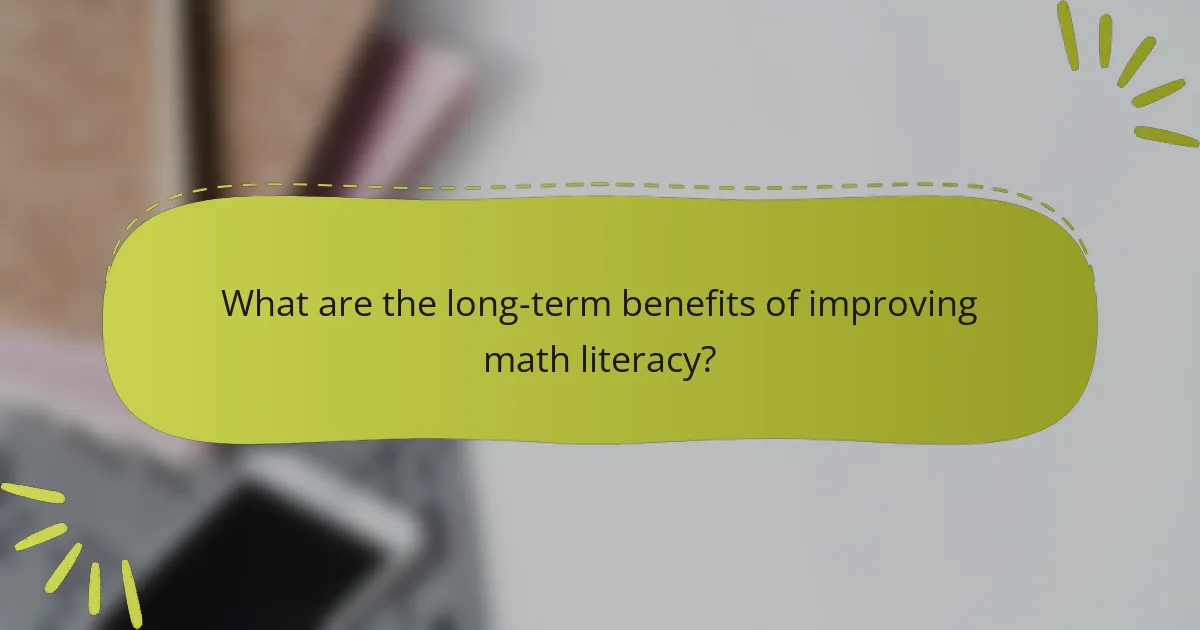
What are the long-term benefits of improving math literacy?
Improving math literacy leads to enhanced problem-solving skills and critical thinking. These skills are essential in various life situations, including personal finance and career advancement. Increased math literacy correlates with higher academic achievement. Research shows that students with strong math skills are more likely to pursue STEM careers. Higher math literacy can also lead to better job opportunities and higher earning potential. A study by the National Center for Education Statistics found that adults with higher math skills earn significantly more over their lifetimes. Additionally, improved math literacy fosters greater confidence in dealing with quantitative information. This confidence can positively impact decision-making in everyday life. Overall, the long-term benefits of improving math literacy are substantial and multifaceted.
How does math literacy contribute to personal financial management?
Math literacy enhances personal financial management by enabling individuals to understand and apply numerical concepts effectively. It allows for better budgeting, as individuals can calculate income, expenses, and savings accurately. Math literacy also aids in comprehending interest rates and loan terms, which are crucial for making informed borrowing decisions. Furthermore, understanding percentages helps individuals evaluate discounts and investment returns. A study by the National Endowment for Financial Education found that individuals with strong math skills are more likely to engage in positive financial behaviors. This correlation underscores the importance of math literacy in achieving financial stability and making sound financial choices.
What skills in budgeting and saving are enhanced by math literacy?
Math literacy enhances skills in budgeting and saving by improving numerical understanding and analytical thinking. It enables individuals to calculate expenses and income accurately. This skill is crucial for creating effective budgets. Math literacy also aids in understanding percentages, which is important for interest rates and savings growth. Individuals can better assess financial options and make informed decisions. Additionally, it fosters the ability to track spending habits over time. Accurate data analysis leads to improved financial planning. Research shows that individuals with strong math skills are more likely to manage their finances successfully.
How does math literacy impact decision-making in daily life?
Math literacy significantly enhances decision-making in daily life. It enables individuals to analyze numerical information effectively. This skill is crucial for budgeting personal finances. Math literacy aids in comparing prices when shopping. It also assists in evaluating risks versus rewards in various situations. According to a study by the National Assessment of [censured] Literacy, individuals with higher math skills report better job opportunities. Furthermore, math literacy improves problem-solving capabilities in everyday scenarios. This leads to more informed and rational choices.
What are the broader societal implications of increased math literacy?
Increased math literacy leads to improved economic outcomes for society. Higher math skills correlate with better job opportunities and higher wages. For instance, individuals with strong math abilities often secure positions in STEM fields, which are in high demand. This can result in a more skilled workforce. A skilled workforce drives innovation and economic growth. Furthermore, increased math literacy enhances critical thinking and problem-solving skills among citizens. This can lead to more informed decision-making in personal finance and public policy. Communities with higher math literacy rates often experience reduced poverty levels. Research indicates that math literacy is linked to higher educational attainment and civic engagement. Overall, increased math literacy contributes to a more prosperous and informed society.
How does math literacy influence economic growth?
Math literacy significantly influences economic growth. It enhances problem-solving skills and analytical thinking in individuals. These skills are crucial for innovation and productivity in the workforce. A mathematically literate population can better understand and engage with technology. This engagement leads to increased efficiency and competitiveness in various industries. Studies show that countries with higher math literacy rates tend to have stronger economies. For example, the OECD reported that nations with better math scores have higher GDP per capita. Thus, math literacy directly correlates with economic performance and growth.
What is the relationship between math literacy and social equity?
Math literacy is closely linked to social equity. Higher levels of math literacy contribute to better economic opportunities. Individuals with strong math skills often have access to higher-paying jobs. This access can help reduce income inequality. Research shows that students from disadvantaged backgrounds benefit significantly from improved math literacy. Programs aimed at enhancing math skills can bridge educational gaps. For example, the National Assessment of Educational Progress indicates that students with high math proficiency are more likely to pursue higher education. This pursuit further promotes social equity by enabling upward mobility.
What practical tips can improve math literacy for students?
Encouraging regular practice can significantly improve math literacy for students. Daily math exercises help reinforce concepts and build confidence. Using real-world applications makes math relatable and engaging. Incorporating games and interactive tools can enhance learning through fun. Providing clear explanations and examples aids understanding of complex topics. Utilizing visual aids, like charts and graphs, supports diverse learning styles. Offering constructive feedback helps students identify and correct mistakes. Creating a supportive learning environment fosters a positive attitude towards math.
The primary entity of this article is math literacy, which significantly impacts student success across academic and career trajectories. The article explores how math literacy enhances problem-solving and critical thinking skills, correlates with improved academic performance in various subjects, and prepares students for higher education and competitive job markets. It also discusses effective strategies for educators and parents to foster math literacy, the long-term benefits of improved math skills, and the broader societal implications, including economic growth and social equity. Overall, the content emphasizes the essential role of math literacy in shaping educational outcomes and future opportunities.
